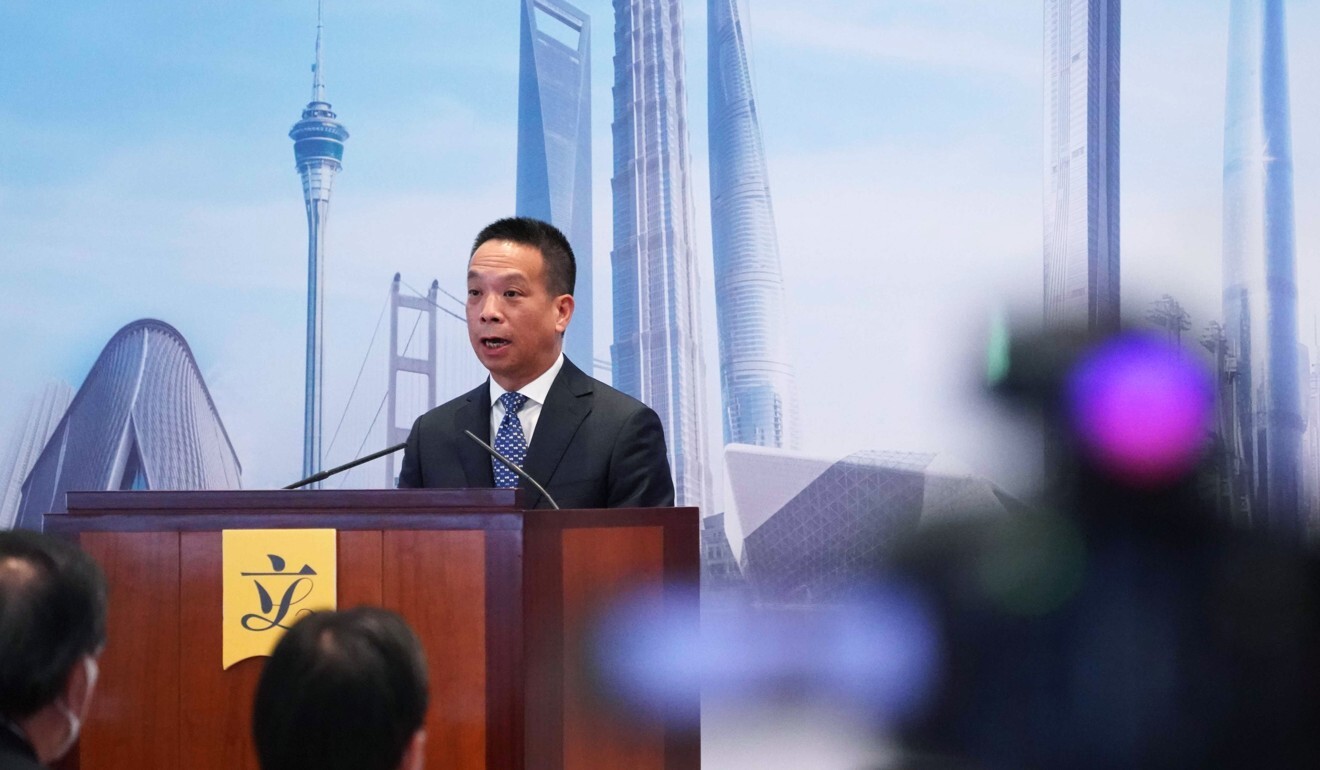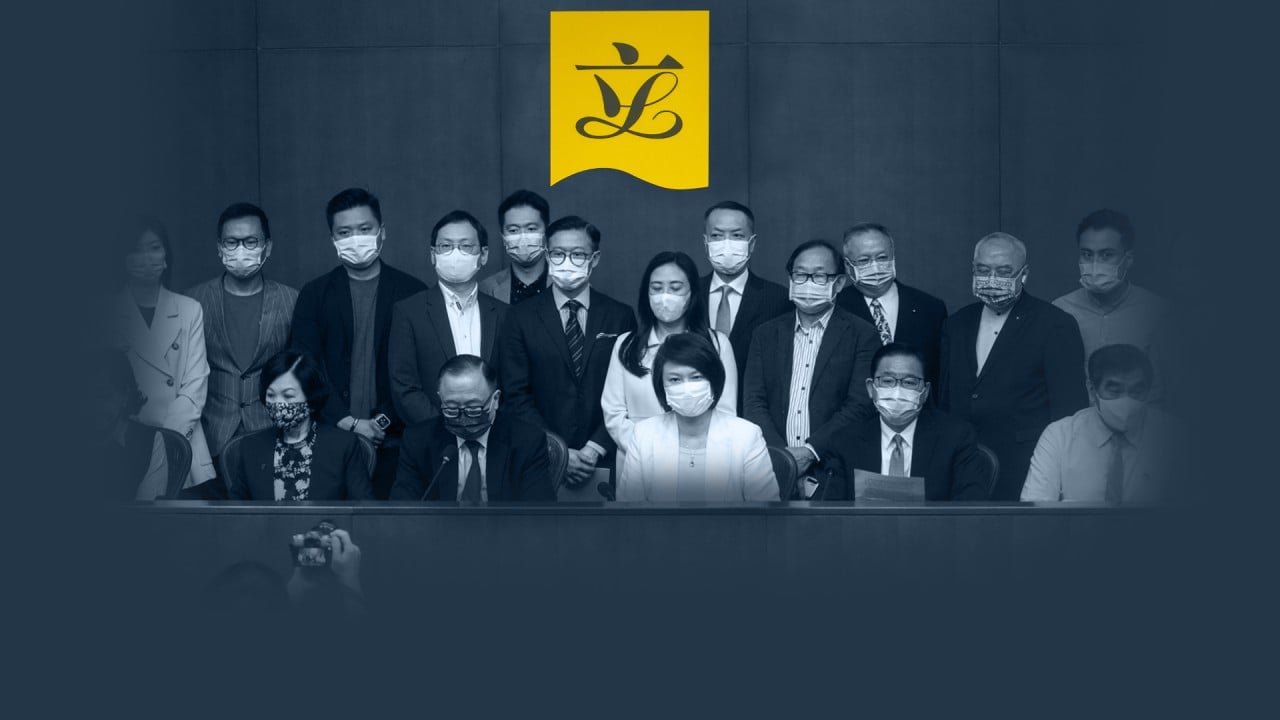
Hong Kong must make up for lost time on economic development, Beijing official tells lawmakers at unprecedented meeting
- Meeting is first time that central government officials have briefed city’s lawmakers on national policies at Legislative Council
- Huang Liuquan, deputy director of the State Council’s Hong Kong and Macau Affairs Office, says unity key to city’s prosperity
The first central government official to brief the city’s legislature, Huang Liuquan, deputy director of the State Council’s Hong Kong and Macau Affairs Office, cited a Cantonese phrase when warning that lost opportunities seldom returned.
“After leaving Suzhou, one will find it hard to get a boat ride,” Huang told lawmakers at a seminar discussing the opportunities offered to the city by the 14th national five-year plan.
Members of the delegation also mapped out their plans for Hong Kong under the country’s so-called dual circulation strategy, a drive to prioritise domestic markets and home-grown innovation amid global economic instability.
The two-hour session marks the first time that central government officials have briefed local lawmakers at the Legislative Council.
Huang said the city must now be brought together after it had been locked in “endless political disputes and internal frictions”, adding: “As such, Hong Kong lost a lot of opportunities, and wasted much time.”
Referring to the draft legislation that sparked the 2019 protests, Huang said: “After experiencing the dark era under the extradition bill saga, people started to understand that without national security, there would not be security for Hong Kong.
“Without the implementation of the principle of patriots administering Hong Kong, there would not be any protection for Hong Kong long term, or stable governance.
“Without unity and harmony in society, there would not be the foundation and conditions for economic development and improvement of people’s livelihood.”
While noting Hong Kong’s many advantages as an international city, Huang said that, given the uncertainty of global politics, its “best choice would be to embrace the motherland’s huge market and take part in the country’s modernisation drive”.
He also praised Legco, which is dominated by pro-establishment lawmakers, for coordinating effectively with the government to pass a series of key bills over the past few months, singling out the timely approval of local legislation for Beijing’s overhaul of the city’s electoral system to ensure the principle of patriots ruling Hong Kong.
Only two opposition and independent lawmakers still serve the legislature following a wave of resignations in the wake of Beijing disqualifying four opposition legislators last November.
Huang said the aim of Monday’s exchange was to introduce the 14th national five-year plan and discuss how the country would strengthen support for Hong Kong, as well as identifying areas of focus for the city.
In his welcoming notes, Legco president Andrew Leung Kwan-yuen said now was the time for Hong Kong to push forward its integration into national development following the city’s return to peace under the national security law, which Beijing imposed on Hong Kong last year to ban acts of subversion, secession, terrorism and collusion with foreign forces.
Leung said he hoped there would be more opportunities for lawmakers to exchange views with central government officials.
Apart from Huang, other speakers at the Legco session included representatives from the National Development and Reform Commission, People’s Bank of China, and Ministry of Science and Technology.
Only four lawmakers were given the opportunity to quiz the officials and experts with just 25 minutes of the two-hour seminar dedicated to questions.
Responding to legislator Jimmy Ng Wing-ka inquiring about Hong Kong’s potential role in the country’s dual circulation strategy, Hu Zhaohui, deputy director of the commission’s department of development planning, said the city was not being asked to shift its focus entirely onto China’s domestic market.
The dual circulation strategy places a greater focus on the domestic market – referred to as internal circulation – as part of the country’s adaptation to an increasingly unstable and hostile outside world.
Under the plan, China is expected to become less reliant on its export-oriented development strategy, or external circulation, without abandoning it altogether.
Hu said internal circulation in mainland China had encountered a “bottleneck” because of shortcomings in the field of technological research.
“And as a separate customs territory, Hong Kong can also contribute much to the external circulation. It is always an important bridge for the country to ‘go out’ and link with the international community.”
Zhou Chengjun, director of the People’s Bank of China’s Finance Research Institute, urged Hong Kong to explore more opportunities for developing renminbi products.
Responding to finance sector legislator Chan Chun-ying, Zhou acknowledged Hong Kong’s mature financial markets but pointed to a lack of products on offer locally in China’s currency as a source of untapped potential.
“The Hong Kong financial sector and its mainland counterpart should engage in more exchanges,” Zhou said.

Following the conclusion of the session in Legco’s dining hall, Huang entered the chamber itself, taking a group photo in front of the presidential podium.
Pro-establishment lawmakers lauded the unprecedented arrangements as they urged more central government officials to visit Legco.
Starry Lee Wai-king, chairwoman of the Democratic Alliance for the Betterment and Progress of Hong Kong, called the change of practice “healthy and positive”.
“More exchanges of ideas are needed, especially when Hong Kong’s future development needs to be aligned with the central government’s 14th five-year plan,” she said.
Asked whether the visit of Beijing officials was inappropriate under the “one country, two systems” principle, Legco president Leung said: “As part of China, why shouldn’t the central government officials visit Hong Kong to communicate with us directly?
“There is no secret. We hope the public who are interested in these topics could understand more about us through this opportunity.”

05:10
Hong Kong's revamped electoral system bolsters pro-Beijing influence in key decision-making bodies
Localist lawmaker Cheng Chung-tai said he could not attend the briefing because he had to take his pet to a veterinary clinic.
“I did not boycott it. The vet appointment was made some time ago so I could not entertain the unexpected event,” said Cheng, adding he watched a live broadcast but declined to comment on how useful the session was.
Monday’s afternoon meeting followed the central government delegation explaining the five-year plan to local officials in the morning.
Approved in March by the National People’s Congress, the plan’s outline deals in part with Hong Kong’s economic development, including how to better integrate the city into the overall development of the country.
Some of the policies include enhancing Hong Kong’s status as an international financial, transport and trade centre, a global aviation hub, as well as a regional trading base for intellectual property.
International relations analyst Derek Yuen Mi-chang, formerly a lecturer at the University of Hong Kong, expected such exchanges to become more common in the future.
“This could be a trial. If there is not much antipathy, it will allow them to arrange talks and discussion forums on a more regular basis,” he said.



